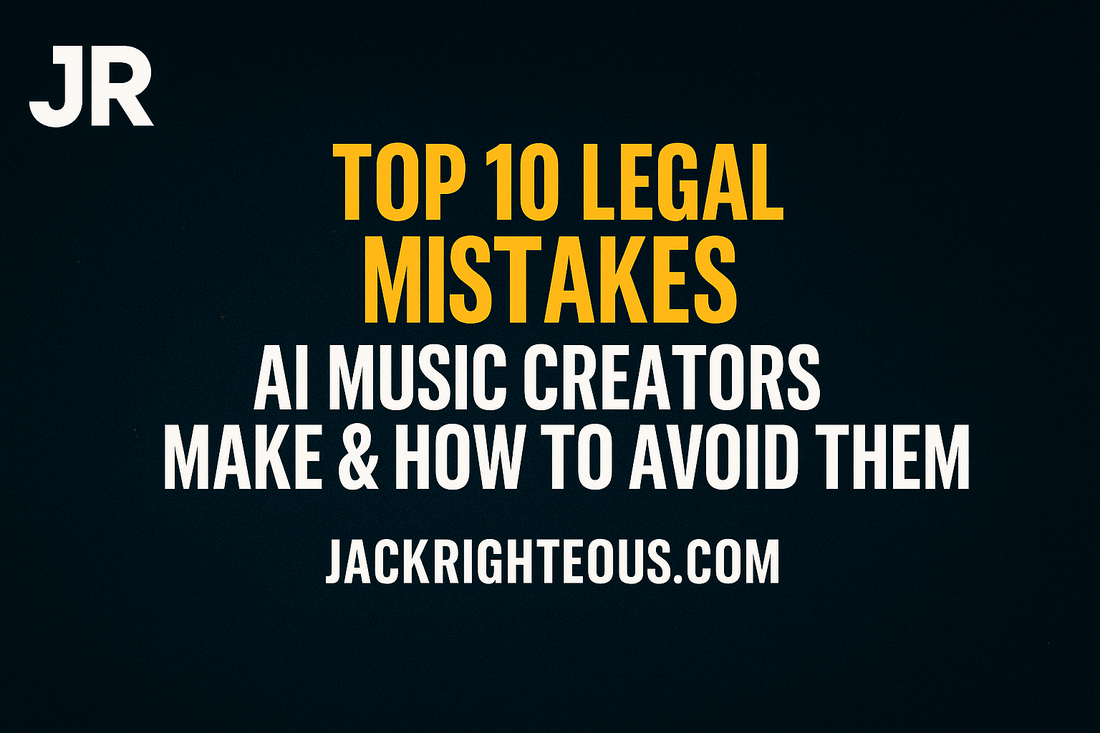
Top 10 Legal Mistakes AI Music Creators Make & How to Avoid Them
Gary Whittaker
Top 10 Legal Mistakes AI Music Creators Make and How to Avoid Them
The rise of AI in music creation has unlocked new possibilities for artists, but it also presents unique legal challenges that can catch creators off guard. Whether you're new to AI music or looking to refine your approach, understanding these pitfalls can protect your work and ensure you're on solid legal ground. Here are the top 10 legal mistakes AI music creators make and how to avoid them.
1. Misunderstanding Copyright Ownership of AI-Generated Music
One of the most common misconceptions among AI music creators is assuming that AI-generated music automatically grants them copyright ownership. However, copyright laws generally require significant human input to qualify for protection. Without active involvement—such as composing, arranging, or adding elements to the music—AI-generated content might not be copyrightable. To ensure you can claim ownership, you must integrate human creativity into the process.
2. Failure to Secure Proper Licenses for AI-Generated Content
Using AI-generated music commercially often requires specific licenses, a fact that many creators overlook. For instance, a paid plan may be necessary to legally use the music in commercial contexts. Without the correct licenses, you risk legal repercussions, including fines and limitations on distributing your work. Always verify that your AI tool’s plan covers the intended use and obtain any necessary licenses.
3. Inadequate or Non-Existent Service Agreements
Clear, legally binding service agreements are essential when creating music for clients using AI. These contracts should outline the scope of work, payment terms, and intellectual property rights, while also specifying that the AI tools are being used under a paid plan to ensure legality. Without these agreements, misunderstandings or disputes can arise, potentially leading to legal conflicts and loss of income.
4. Neglecting to Register Copyrights for AI Music
Registering your AI-generated music for copyright protection is a crucial step that many creators skip. However, copyright registration provides essential legal protection and allows you to enforce your ownership rights. To strengthen your copyright claim, consider adding human elements to the song, such as replacing AI-generated instruments and vocals with human performances. This approach not only enhances originality but also solidifies your legal standing.
5. Confusion Between Personal and Commercial Use Licensing
There's often confusion regarding the difference between personal and commercial licenses for AI-generated music. Personal use typically covers non-commercial, private enjoyment, while commercial use involves selling, distributing, or publicly performing the music. Commercial use generally requires a paid plan, and misusing music under a personal license can lead to legal action. Make sure your licensing matches your intended use to avoid these issues.
6. Overlooking International Copyright Issues
When distributing AI-generated music globally, it's vital to understand international copyright laws. Many creators mistakenly believe their local copyright registration or paid plan is enough for global protection. However, different countries have varying copyright laws, and treaties like the Berne Convention may only offer limited coverage. To avoid legal complications, ensure your music is protected in all regions where it will be distributed.
7. Improper Attribution of AI Contributions
Properly attributing contributions made by AI, as well as any human collaborators, is critical to avoiding disputes over ownership and royalties. Failing to do so can lead to legal challenges, especially when using paid AI tools that require clear attribution. Transparency in crediting all contributors ensures that everyone involved in the project is recognized and that your work remains legally secure.
8. Lack of Clear Terms for Revisions and Deliverables
Contracts for AI-generated music should include clear terms regarding revisions, deliverables, and timelines. AI-generated music is often just the first step, with additional mastering and production required to achieve a professional sound. Clearly defining these terms in your contracts helps manage client expectations and ensures that the final product meets both parties' standards.
9. Ignoring Data Privacy and Security in AI Music Projects
Data privacy and security are increasingly important in AI music projects, particularly when using tools that process personal data or proprietary content. Creators must ensure that any data used in the AI process is secure and complies with data protection laws such as GDPR or CCPA. Failing to protect this data can lead to legal liabilities and damage your reputation.
10. Underestimating the Need for Ongoing Legal Updates
The legal landscape surrounding AI-generated content is rapidly evolving. It's crucial for AI music creators to stay informed about new laws, regulations, and court rulings that could impact their work. This is especially important when using a paid plan that allows for commercial use. Staying updated helps you avoid legal pitfalls and ensures that your music remains protected in a changing environment.
Ready to Launch or Level Up Your AI Music Journey?
🔹 Start Here – The Suno AI Creator Guide:
https://jackrighteous.com/pages/suno-guide-getting-started
🔹 Learn to Brand with Sound – GET JACKED Into Suno Branding:
https://jackrighteous.com/pages/start-ai-music-branding
🔹 Unlock the Full Anthem Path – GET RIGHTEOUS System Access:
https://jackrighteous.com/pages/get-righteous-anthem-guide
(Requires one of the following:
– https://jackrighteous.com/products/get-jacked-full-pro-kit
– https://jackrighteous.com/products/get-jacked-pro-ai-music-kit
– https://jackrighteous.com/products/sanctuary-digital-download-support-the-album-build)

